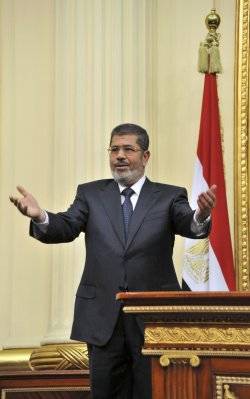Egypt's chief prosecutor has ordered an investigation into allegations that opposition leaders committed treason by inciting supporters to overthrow President Mohammed Morsi.
The probe, launched on Thursday, targets opposition leaders Mohammed El-Baradei, a Nobel Peace laureate and former head of the UN nuclear agency, former Foreign Minister Amr Moussa, and Hamdeen Sabahi. Both Moussa and Sabahi were presidential candidates who competed against Morsi in the last election.
The Muslim Brotherhood's website alleged that the opposition leaders were "duping simple Egyptians to rise against legitimacy and were inciting against the president," which constitutes treason.
The allegation came a day after the president called for a dialogue with the opposition to help solve disputes over a Muslim Brotherhood-backed constitution that was just approved in a referendum.
The accusations were filed by two lawyers during a political crisis earlier this month over a series of presidential decrees that granted Morsi and the committee drafting the disputed constitution immunity from judicial oversight.
The opposition decried the investigation as a throwback to Hosni Mubarak's regime, when the law was used to smear and silence opponents.
Emad Abu Ghazi, secretary-general of the opposition party that El-Baradei heads, said the investigation was "an indication of a tendency toward a police state and the attempt to eliminate political opponents".
He said that Morsi is dealing with the opposition similarly to Mubarak, the ousted leader who had allegedly jailed his opponents without allowing fair trials.
Heba Yassin, a spokesperson for the Popular Current coalition led by Sabahi, said that Sabahi faced similar charges under Mubarak and his predecessor.
"Morsi is confirming that he is following the same policies of Mubarak in repressing his opponents and trying to smear their reputation through false accusations," Yassin said.
"Also this is evidence of what we had warned about - the judiciary and the prosecutor-general must be independent and not appointed by the president," she said.
Constitutional crisis
Morsi, Egypt's first democratically elected president, asked the opposition on Wednesday to join a national dialogue to heal rifts after a month of huge street protests against him and the controversial constitution.
Some of the protests erupted into deadly violence. On December 5, anti-Morsi demonstrators staging a sit-in outside the presidential palace in Cairo were attacked by Morsi supporters. Fierce clashes ensued that left 10 people dead.
Even though the constitution passed in a referendum, the opposition has vowed to keep fighting it. They say it prioritizes Islamic law in the country, undermines rights of minorities and women, and restricts freedoms.
Although he reached out to the opposition for reconciliation, Morsi did not offer any concessions in his speech on Wednesday calling for a dialogue.
On Wednesday Morsi asked his prime minister to carry out a limited reshuffle of his government, without offering any seats to the opposition.
In an apparent protest against the decision to keep the same prime minister, the country's minister of parliamentary affairs resigned.
It is the second resignation of a cabinet minister this week and follows a spate of resignations of senior aides and advisers during the constitutional crisis.
PHOTO CAPTION
In this image released by the Egyptian Presidency, Mohammed Morsi addresses the newly convened upper house of parliament in Cairo, Egypt, Saturday, Dec. 29, 2012.
Aljazeera


 Home
Home Discover Islam
Discover Islam Quran Recitations
Quran Recitations Lectures
Lectures
 Fatwa
Fatwa Articles
Articles Fiqh
Fiqh E-Books
E-Books Boys & Girls
Boys & Girls  Hajj Rulings
Hajj Rulings Hajj Fatwas
Hajj Fatwas














